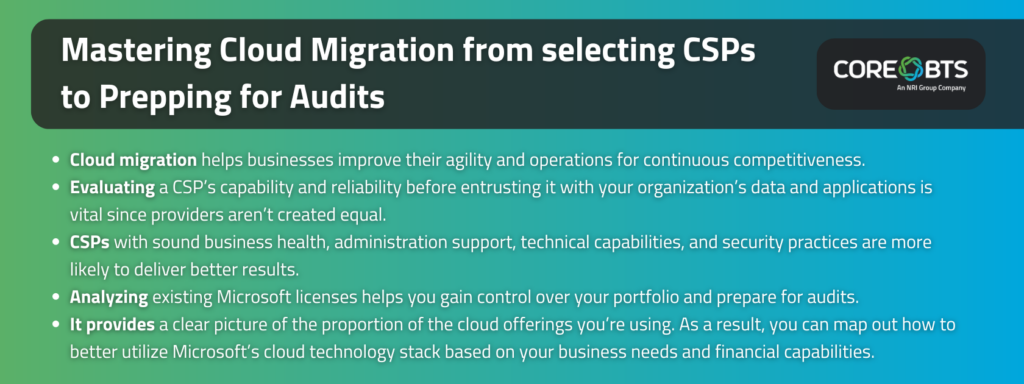Here’s what you need to know about the complexities of CSP selection, Microsoft portfolio management, and audit preparedness.

Modern businesses urgently need to evolve into nimble, fast-moving entities to keep up with growing margin pressures, changing regulatory and customer demands, constant innovation, and increasing competition.
Cloud modernization is essential to achieving that agility and staying ahead of the curve. It enables access to on-demand computing power and storage, more effective data usage, quick responses to changing business conditions, and exponential productivity gains.
That said, cloud migration is fraught with challenges, and selecting the right cloud service provider (CSP) can seem elusive. Luckily, you can come out on top by staying proactive from the start.
Choosing the Right CSP
Partnering with a CSP is one of the best ways to quickly transition to the cloud. However, you need to be careful in your selection since providers aren’t created equal; while some consistently deliver solid results, others struggle to meet diverse business needs.
If you’ve worked with a suboptimal CSP before, you know that it quickly turns problematic. Some common themes tend to emerge:
- Inadequate security and recovery strategies: If a CSP doesn’t provide adequate security features, it can put sensitive information at risk. If they also lack robust data backup and recovery plans, it could lead to prolonged downtime and disruptions in the event of a cyber attack, system failure, or physical damage to data centers.
- Poor support: CSPs that don’t consistently provide the technical support and customer service levels your business deserves means poor user experiences. Slow response and issue resolution leads to frustration and reduced productivity among end users.
- Inadequate scalability and performance: CSPs that do not have sufficient resources, support for auto-scaling, and flexible infrastructure configurations to meet the growing needs of businesses can negatively affect the reliability and availability of applications and services. Inadequate support in these areas may lead to performance issues, downtime, and challenges in scaling resources to match demand.
Vetting a CSP’s capability and reliability beforehand can mean all the difference in your selection. Microsoft recommends evaluating potential partners based on four criteria: business health, administration support, technical ability, and security practices. This approach provides a more holistic view of which candidate is the best fit now and as your business evolves.
Microsoft Portfolio Management and Audit Preparedness
Businesses must treat their Microsoft portfolio as a tangible asset and understand how pricing and licensing terms affect cost and compliance. Additionally, they must have a strategy that lets them exercise control over the portfolio and meet their legal obligations.
Microsoft periodically audits customers onsite or through a self-assessment to ensure they have valid licenses and use them within agreed-upon terms. Businesses found to be out of compliance are required to purchase licenses or pay a fine.
For example, unlicensed usage of more than five percent of a license value obligates businesses to pay the full retail price plus the audit fee. Some types of non-compliance attract a penalty of up to four times the license price. With these considerations, it’s easy to see why having control over your Microsoft portfolio is paramount.
For effective compliance, businesses must maintain an accurate inventory of applicable software, users, and devices. Luckily, several solutions are available. For example, software asset management (SAM) tools help track assets scattered across multiple sources. Similarly, bringing in a resource to assess and optimize your Microsoft portfolio creates an additional layer of control.
Staying on top of your Microsoft portfolio has many benefits beyond promptly responding to and passing license compliance verification requests. For example, businesses often pay for more licenses than needed due to decommissioned equipment, technology changes, reduced business and employee size, and several other reasons. Others simply don’t capitalize on their Microsoft cloud technology consumption. Understanding your Microsoft portfolio helps optimize usage and yields significant licensing cost savings now and in the future.
Analyzing and interpreting license usage can be daunting since rules governing software licensing are always evolving and complex. But this won’t be an issue when you hire licensing experts to maximize the value of the Microsoft platform. These experts ensure you make the most of what you pay for. At the same time, they help reduce unnecessary costs by aiding compliance and eliminating licenses you don’t need or use often.
Taking Onloud Migration With Core BTS
No matter where you are on your cloud migration journey, Core BTS can help you chart a clear path forward. We offer cost predictability, flexibility, stability, and agility to help you maximize IT investments. Our team of proven experts specializes in creating and managing workloads in hybrid cloud environments and has been helping businesses solve their most pressing technology problems since 2004. So rest assured you’re in safe hands.
More than being a CSP, Core BTS is your business partner and an extension of your team. We don’t simply do things for you; we walk with you every step of the way, helping you anticipate change, navigate challenges, and drive greater value.
Explore a case study of how Core BTS helped an organization grow its Microsoft cloud technology consumption from 3% to 64% within three years while staying compliant and keeping costs in check.





Share on